One of the important elements of landscape design is mulch. Its functions include retaining moisture, keeping weeds away, and helping plants grow even in difficult soils. Also, mulches add visual appeal to your yard. However, there are certain things that you need to consider before settling on a type of mulch, and one is the safety of your pets, particularly dogs.
There are mulches that were found to be dangerous to dogs. When certain types of mulches are consumed, dogs may get poisoned, suffer allergies, or even gastrointestinal obstruction.
Cocoa mulch. A very popular gardening product made from cocoa shells, cocoa mulch contains theobromine, a toxin that is dangerous to dogs.
Pine needle mulch. Considered harmful to dogs if swallowed, pine needle mulch can damage the stomach lining of your pet.
It is the nature of dogs to chew on things whenever they are alone or get bored. So, in choosing mulches, avoid those with larger chunks as they can cause gastrointestinal obstruction if swallowed.
Watch out for any possible allergic reactions, such as wheezing or having skin rashes, if you just added new mulch to your garden. If these occur, immediately remove the mulch and replace it with a different mulch.
Don’t just choose a type of mulch just because it can adapt to the kind of plants you have in your garden and to the area’s humidity—always consider the safety of your dogs.
Rubber mulch. Typically made from recycled tires, rubber mulch is a very durable option that can last for years. Since it looks just like wood without the sweet smell like what other types of mulch have, your dog will less likely attempt to chew on it. Still, your dogs are at risk of gastrointestinal obstruction if they chew on rubber mulch out of restlessness.
Untreated wood mulch. Avoid wood mulches that are dyed and added with chemicals as they are not good for the environment and for your dogs.
Cedar mulch. A popular alternative among pet owners, cedar mulch is a pet-friendly mulch because it is shredded finely. In case your dog ingests the fibres, it can be easily digested. Plus, cedar mulch has bug repelling properties fit for gardens.
Cypress mulch. A very common type of mulch used in landscaping, cypress mulch is not toxic to dogs.
So, before you settle on buying bags of mulches from home renovation stores and landscaping shops online, consider their effect on your pets. Decide on one that is beneficial for your landscape design and safe for the environment and your pets.
Do Use These Mulch Alternatives with Dogs
Cedar is the most popular type of mulch alternative for gardeners who have dogs. It is shredded finely enough to not be attractive to chewers. If it does happen to be swallowed in small amounts, it can be digested. And it even repels fleas and other undesirable insects.
As long as the fibers and pieces are thin and small enough, coconut coir mulches are an excellent choice for use around pets. They’re not toxic, and the small pieces shouldn’t present any risk of bowel obstruction if a piece happens to get swallowed. However, you don’t want your dog ingesting large amounts of any non-food material, so if your pet is chewing on the coconut mulch or eating it, you’ll need to find another option.
Coconut coir is good at retaining moisture and it also provides great drainage. It also has a neutral pH level. It will help with keeping weeds and slugs at bay, too.
As long as your grass clippings have never been treated with pesticides or herbicides, they are safe to use in areas where dogs will play. Let grass clippings dry out before spreading them in your garden as a mulch alternative.
Just keep in mind that the warning against grass treated with pesticides or herbicides is quite serious. Consuming grass that has ever been treated with pesticides or herbicides can be dangerous or fatal for dogs, and some pesticides can cause bladder cancer in dogs.
Shredded newspaper keeps moisture in the soil where plants can use it. In warm weather, it will help keep the ground cool, while when it is cold, it will warm the soil up a bit. Newspaper even helps keep weeds out of your garden. Moisten the newspaper before you spread it in the garden so that it will stay in place.
Newspaper is not the most beautiful mulch alternative out there, but it’s an excellent choice if you have a dog that’s an aggressive chewer. It isn’t an attractive option for most dogs, but even if your dog happens to consume it, it won’t harm your pet.

Shredded leaves make a good mulch, as long as they are from a tree that is not toxic to your pet. Before you use shredded leaves in your garden, do a quick Google search to make sure that the tree they come from is not one that’s toxic if consumed by pets. As long as you get the all-clear, you can safely use nontoxic leaves around your dog.
You can even collect fallen leaves from your yard, making shredded leaves a really affordable mulch alternative. Leaves must be dried out before you add them to your garden as mulch. The leaves will decompose quickly in the garden, releasing plenty of nutrition into the soil for your plants.
To prevent the spread of plant disease in your garden, make sure that the leaves you use as mulch do not touch the plants. Leave a margin of a couple of inches of empty space between your plants and the leaf mulch.
Rubber mulch is made from recycled tires, so most dogs won’t be attracted to the smell or flavor. However, you know your dog best. Some dogs are just prone to chewing, and if yours is a chewer, rubber mulch may be problematic.
The pieces are small enough for some dogs to consume them whole, and other dogs may be able to break off a piece by chewing that they can swallow. If swallowed, rubber mulch is dangerous because it can cause a bowel obstruction.
You may wish to use a small amount of rubber mulch at first and supervise your dog heavily to determine whether they’ll be attracted to it. As we said at the outset, most dogs aren’t—so use your best judgment about whether rubber mulch makes the safe list with your particular dog.
Rubber mulch looks just the same as a wood mulch in the garden. However, it’s much more durable and long-lasting than wood mulches, and it won’t require replacing as frequently as a wood mulch would.
Mulches made out of rocks or stones don’t really have a flavor or aroma at all, so most dogs won’t be tempted to chew on them. However, if your dog is prone to chewing on rocks or stones, don’t use these mulches in your garden, since your pet could break a tooth or swallow the stones if they are small enough.
In most cases, however, stone or rock mulch is a safe mulch alternative to use if you have dogs. Stone and rock mulches do a good job of keeping moisture in the soil. However, they don’t decompose fast enough to provide any added nutrition. For this reason, you may wish to use a fertilizer in conjunction with stone or rock mulches.
These mulches also have a tendency to heat up in the sun. If they touch your plants’ foliage, the plants can be damaged or scorched. There’s a simple solution to this problem, though. Just leave an empty margin of a couple of inches between your plants and the stones or rocks.

These aren’t the most commonly used option as a mulch alternative, but they work well, especially around pets. Because of their texture, straw and hay mulches aren’t attractive to most dogs. If your dog does consume some straw or hay, it is digestible.
Straw and hay mulches do a great job of keeping moisture in the soil and keeping weeds at bay. As an organic mulch material that decomposes rather quickly, straw and hay also add vital nutrients to the soil as they break down. However, this means that straw and hay mulches do need to be replaced a bit more frequently than some other mulch alternatives.
Straw and hay are affordable and easy to install, particularly over large areas. Some gardeners don’t like the look of straw and hay mulches, so they add another layer of a prettier mulch down over the top of them.

As long as bark mulches are made of untreated wood and are a nontoxic wood, they are safe to use around most dogs. (As we’ve said before, if your dog is prone to chewing, this mulch may present a problem.) Oak, cherry, and trumpet vine cedar are examples of toxic wood. On the safe list are crabapple, dogwood, and Douglas fir.
There are so many different types of wood used in bark mulch that you may need to do a bit of Googling to determine whether the bark mulch you’re considering is toxic to dogs or not. Consult the packaging to find out whether the wood is treated (or dyed) or untreated. The same goes for sawdust, wood chips, or any wood-based mulch.
Bark is an excellent mulch alternative because it tends to break down quickly, filling the soil with nutrients. However, this also means you’ll need to replace bark mulch more often than you will more durable mulch alternatives. Bark naturally repels water, so it works best in parts of the garden that are not currently planted.
Signs of Digestive Obstruction in Dogs
Some dogs can’t help but eat things they shouldn’t, leading to a digestive obstruction. As the name implies, a digestive obstruction is a partial or total blockage in the digestive tract, usually in a dog’s stomach or intestines.
An obstruction prevents solids and liquids from moving through the digestive tract, ultimately cutting off blood flow to the area, causing serious harm, including irreversible tissue death.
Signs of a stomach obstruction in dogs include:
As with poisoning, digestive obstruction in dogs isn’t something to treat at home or wait out. Call your vet right away.
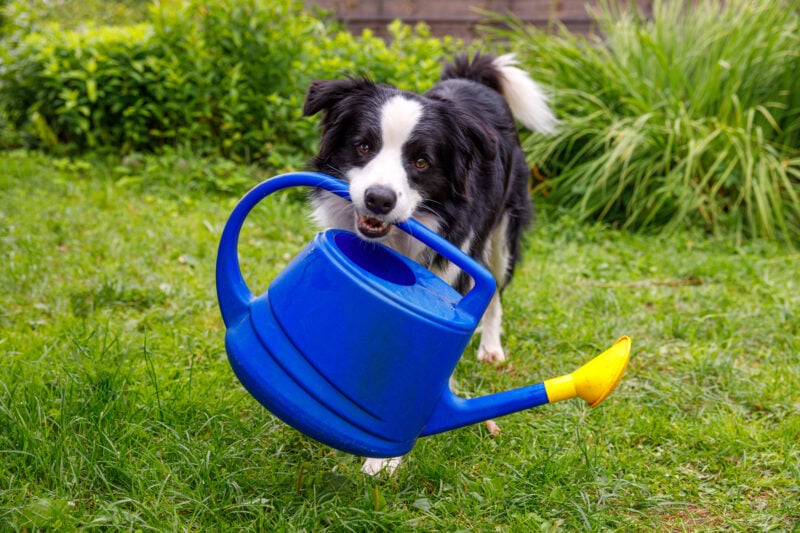
You might still have some questions surrounding mulch and dog-safe options. Check out the most commonly asked questions and answers about dog-safe mulch.
Dogs may eat mulch because of its smell since it often contains composted materials that can be a sensory smorgasbord to canines. Other mulches bear a sweet smell reminiscent of food, like cocoa bean mulch.
Yes – it can be. Mulch can be dangerous to dogs since it often contains toxic ingredients, including pesticides. It may also feature pieces with sharp edges that can injure your dog’s paws, mouth, and intestines if ingested. Your dog may suffer a digestive obstruction as well if he eats mulch.
Mulches to Avoid: 4 Mulches That Can Be Dangerous for Dogs
Unfortunately, countless dangerous ingredients are used in landscaping, and mulch is no different. Here are four mulches to avoid if you have doggos.
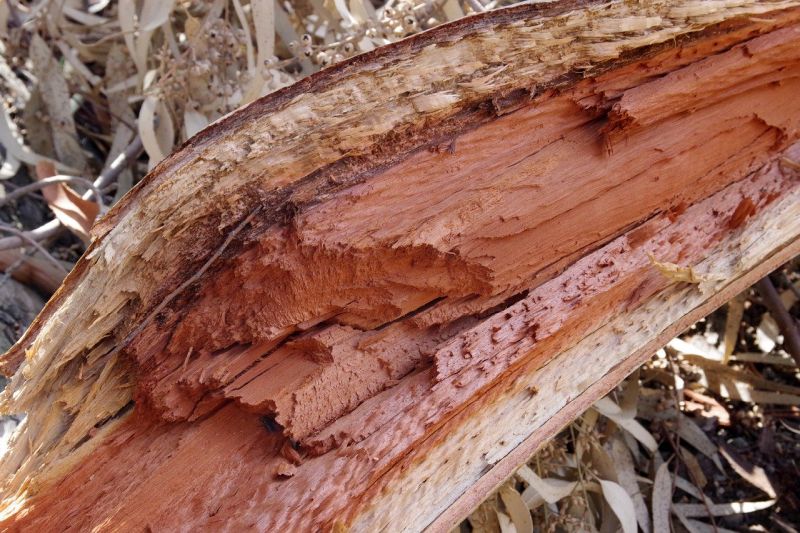
Eucalyptus mulch has a pleasant smell and features natural insect-repelling properties, which wins over many gardeners. But sadly, eucalyptus bark and leaves are toxic to dogs. Eucalyptus can cause vomiting, diarrhea, and other serious side effects if ingested.
Eucalyptus isn’t as long-lasting as other mulch options, nor is it as readily available stateside, making it pricier. Dog-safe solutions with a nose-pleasing scent and pest-repelling nature are cedar, pine bark, and coco mulch.
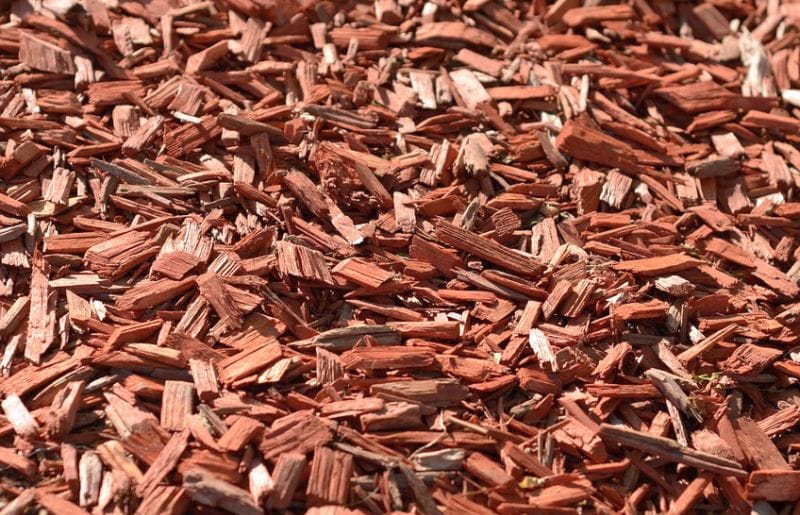
Various types of mulch are often dyed and chemically treated to achieve rich color, prevent weed growth, and repel insects. While these additions benefit your garden’s looks, they also put your dog at risk since many of these ingredients are toxic.
If you’d like rich color and natural insect protection in your garden, check out cedar mulch for a more pup-friendly solution.
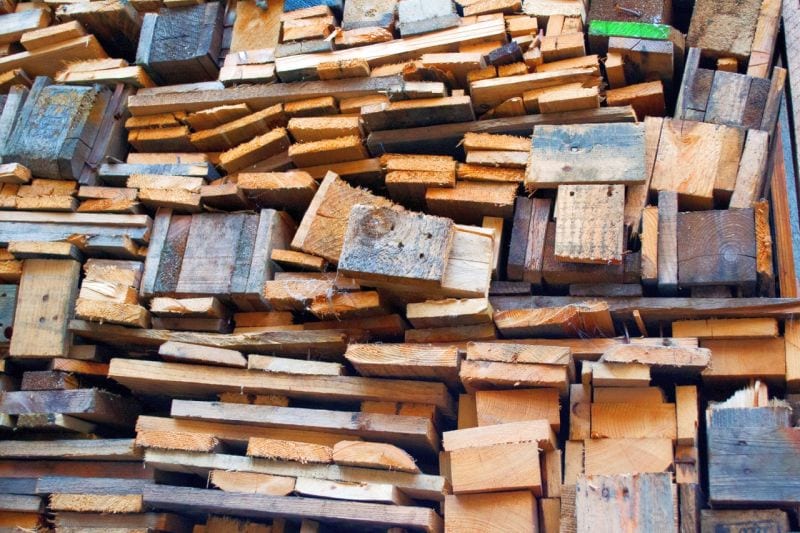
Mulches made with salvaged wood are among the cheapest options available, but they contain too many unknowns for pup parents to contend with. You don’t know what chemicals salvaged wood was subjected to during processing, potentially putting you and your four-footer at risk. Salvaged wood mulches don’t offer the best water penetration, either, potentially harming surrounding plants.
Any of the dog-safe mulches discussed earlier will make better, safer alternatives.
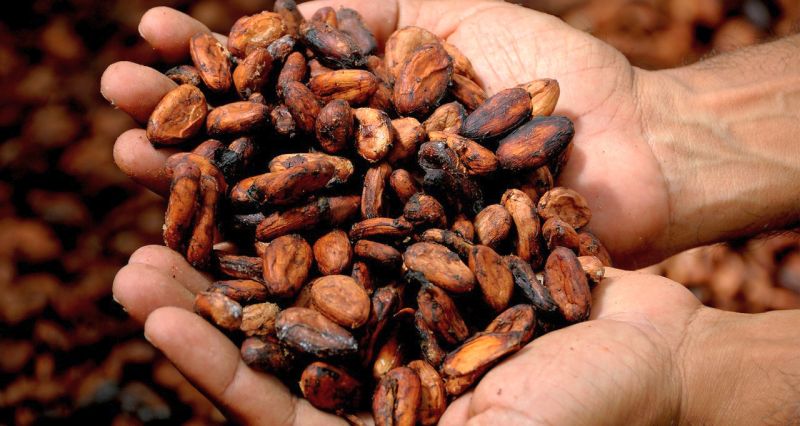
Featuring a cloyingly sweet smell and rich color, cocoa bean mulch is popular with gardeners, but this cocoa shell-derived product is toxic to dogs. Cocoa bean mulch contains theobromine, the same poisonous ingredient found in chocolate. Thanks to that sweet smell we mentioned, it’s also tempting for pups to eat, making it quite dangerous.
Comparable dog-safe mulches with pleasant aromas include cedar and pine bark.
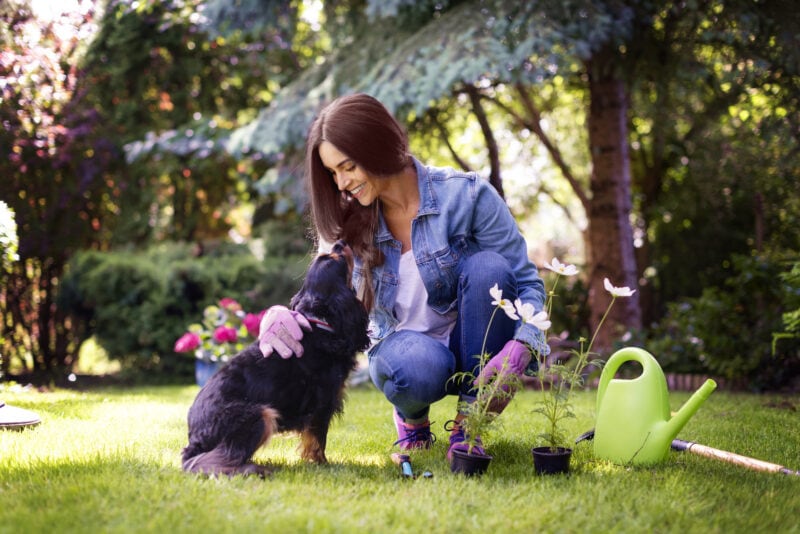
While we’ve included the best dog-friendly mulches on this list, your dog should never consume mulch, as every form poses a serious obstruction risk, regardless of ingredients. Not only does mulch risk blocking your dog’s digestive tract, but jagged edges can cause oral injuries and internal damage if swallowed.
Other dog-friendly gardening tips:
Thinking about seeding your yard or throwing down some new sod? Be sure to check out our article about the best grass for dogs.
Grass typically doesn’t represent much of a safety concern for our pooches, but some varieties will stand up much better to the wear and tear dogs can inflict.
Gardening with your doggo is a great way to bond and soak in fresh air and sunshine, but the wrong products can leave your floof in a load of trouble. Carefully research plants, gardening products, and chemicals before introducing them to your garden, and never let your dog eat anything you’re not 100% sure is dog-safe.
Watch out for these signs of poisoning in dogs:
If you know what your dog ate, give the ASPCA Pet Poison Hotline a call along with your vet. Never take the “wait and see” approach with poison, as time is of the essence for treatment.